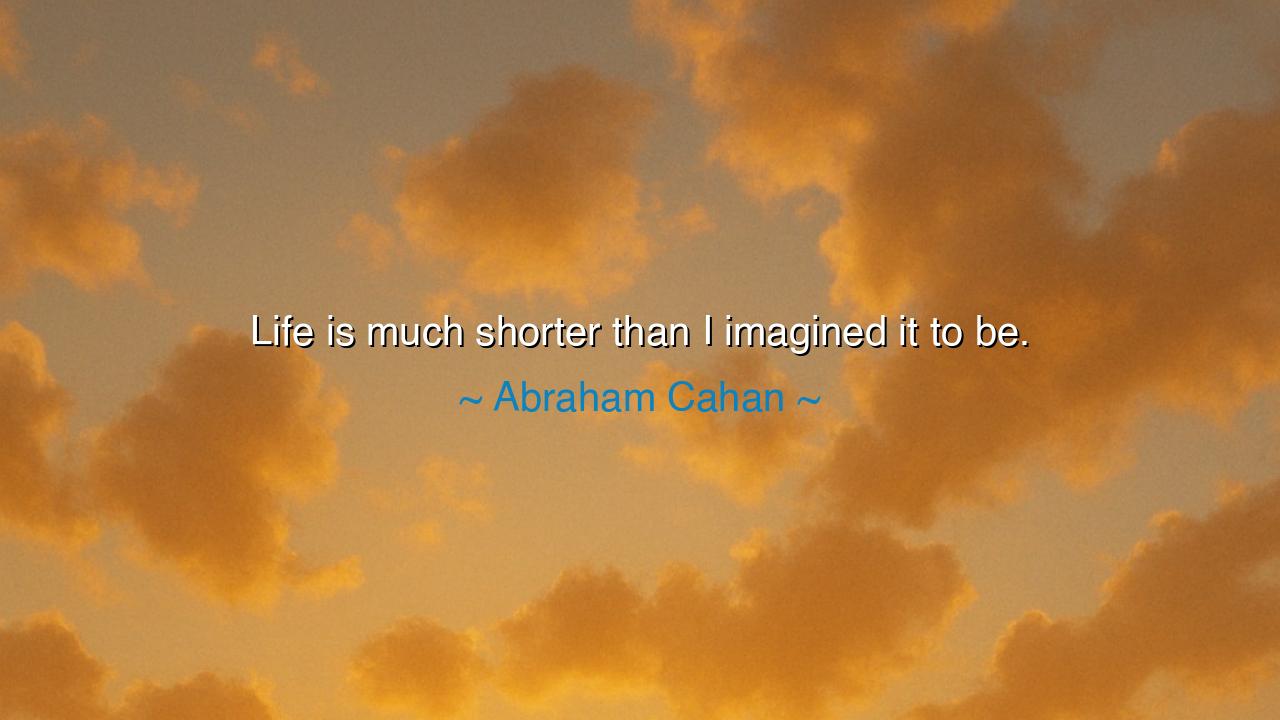
Life is much shorter than I imagined it to be.






“Life is much shorter than I imagined it to be.” – Abraham Cahan
These words, spoken by Abraham Cahan, carry the quiet ache of a man who had walked far, worked long, and awoken one day to find that time had slipped like water through his fingers. They are not a cry of despair, but of realization — a moment when the soul, pausing in its endless striving, looks back and marvels at how swiftly the days have fled. To say that life is shorter than imagined is to admit that even the longest journey feels brief once it nears its end. It is the wisdom of one who has lived fully enough to understand that time, though infinite in the stars, is painfully finite in the heart of man.
Cahan, a writer, reformer, and voice for the immigrant soul in America, knew much of labor and longing. Born in Lithuania and cast into the tide of the New World, he spent his life teaching, writing, and fighting for justice among the poor. His hands were never idle, his mind never at rest. Yet even he — who had filled his days with purpose — came to see that life, no matter how rich, is fleeting. The very act of living seems eternal when one is young; but the older we grow, the faster the years collapse, folding upon themselves like pages in a closing book. His words, simple and unadorned, are a whisper of that truth: that time is the one wealth that cannot be stored, and the one teacher that never repeats its lessons.
The ancients, too, spoke often of this mystery. Seneca, the Stoic philosopher, wrote that “it is not that we have a short time to live, but that we waste much of it.” He warned that men are thrifty with their gold but reckless with their days — that they treat time as endless until it is gone. Cahan’s lament stands beside Seneca’s wisdom, yet with a more tender tone. It is not rebuke but reflection; not condemnation but wonder. It reminds us that even when we live earnestly, striving for meaning and good, life still feels too short — for the heart’s capacity for experience is vast, and the world’s beauty too immense to ever be fully known.
Think of Alexander the Great, who at the age of thirty wept because there were no more worlds to conquer. He, too, felt the brevity of existence, though his was filled with victory and glory. Yet what did his empire avail him? His name endured, but his days were as numbered as the humblest shepherd’s. And so, whether one reigns over nations or simply tends a garden, the truth remains: the measure of life is not in years, but in the depth with which one lives them. Those who fill their days with love, curiosity, and purpose may still find them short — but never empty.
Cahan’s insight carries within it both sadness and grace. There is melancholy in realizing that no lifetime is long enough for all we hope to do — to love all we wish to love, to create all we dream to create, to see every sunrise and every land. Yet within that sadness lies a gift: the reminder to cherish the present, to waste none of it in bitterness or regret. When we understand that life is brief, we begin to live more deliberately. The brevity of life, then, becomes not a curse, but a catalyst for meaning.
The lesson is this: do not wait for the “right time” to live. There is no later, only now. Speak the words you have long held back; forgive those who weigh upon your heart; look often at the sky, and remember how miraculous it is to be alive at all. Measure your wealth not in possessions, but in moments truly lived — in laughter shared, in kindness offered, in beauty noticed. For when you reach the end of your days, it will not be your achievements that you remember, but the small, shining instants of connection and wonder that made you feel infinite, if only for a moment.
So hear the wisdom of Abraham Cahan, whispered through time: “Life is much shorter than I imagined it to be.” Let his realization become your awakening. Live while you have breath — not hastily, but deeply. Let no sunrise go unseen, no act of love unspoken, no joy unexplored. For though life is shorter than we imagine, it is also richer than we believe — and to live with that awareness is to turn even its brevity into something eternal.






AAdministratorAdministrator
Welcome, honored guests. Please leave a comment, we will respond soon